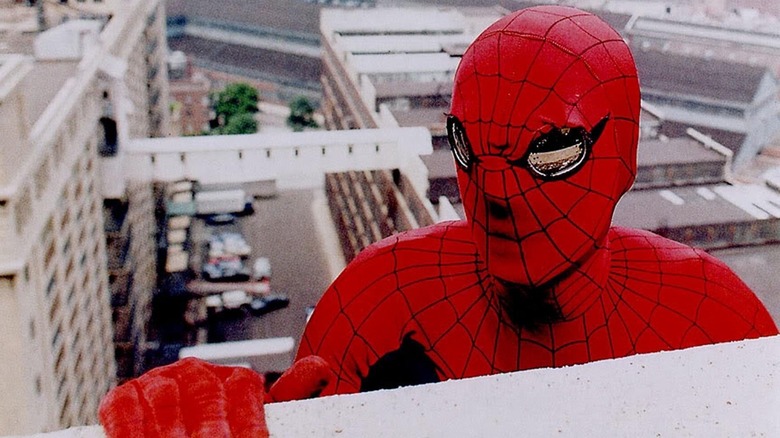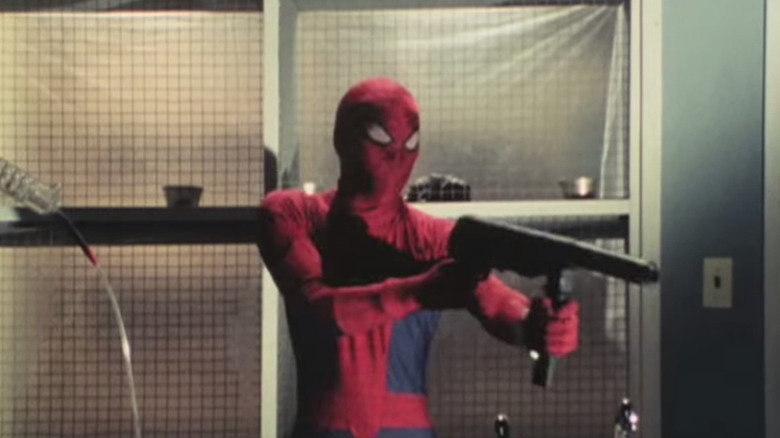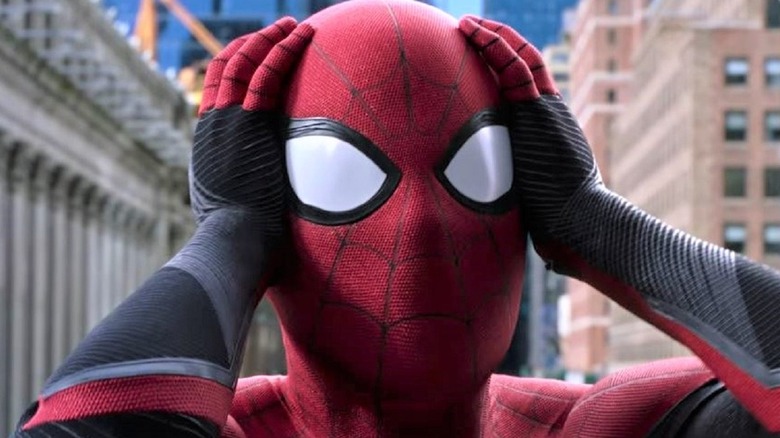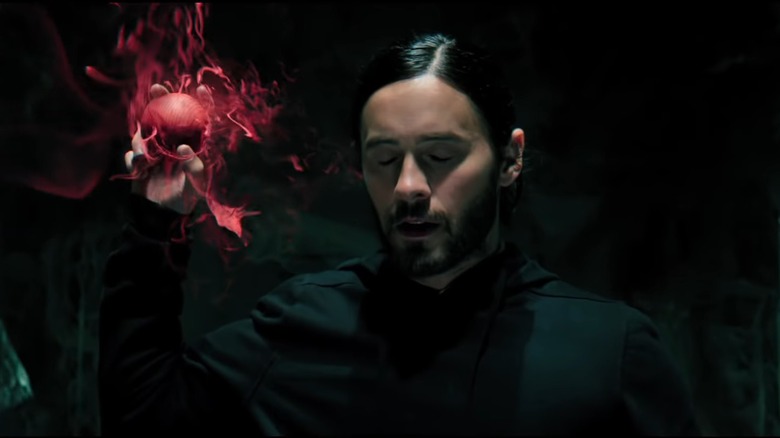The Correct Order To Watch All Of The Spider-Man Movies
There are more Spider-Man movies than you think, and most of them might take place in the same universe.
Mass audiences may see a certain string of high-profile, well-moneyed, live-action Spider-Man films — that is, the ones released from 2002 until 2022 — as the only "official" ones, largely because of how much media exposure they got. In that span, there were five separate notable Spider-Man continuities, but those continuities became a little bit chummy as time passed. Eventually, at least three of those continuities would cross over with one another. These kinds of crossovers, however, are easy for Spider-Man fans to accept, as parallel universes have been a common feature in Spider-Man comics going back many decades.
Also, Spider-Man appeared in so many animated shows and movies over the years that it took no major mental calisthenics to imagine each version existing in its own world. Spider-Man gets rebooted all the time, it seems, so why not mix every batter recipe together? Indeed, the 2018 film "Spider-Man: Into the Spider-Verse" introduced the notion that every Spider-Man from every parallel universe is just as "official" as any other and that apertures between dimensions are common. Spider-Fans, then, would be allowed to squint and pretend that every single version of Spider-Man is all part of one, vast, complicated, supra-canon.
And to this, it all sprung a simple origin story of a radioactive teenager who can climb walls.
As of this writing, there are 21 Spider-Man movies, with a 22nd and a 23rd slated for release in 2024, and a 24th and 25th still in production (the release dates have not been settled on). This list will include every feature film wherein Spider-Man is a notably featured character, as well as a few spin-offs that take place in an established Spider-Man universe.
The release order
The chronological list of Spider-Man movies runs thus:
- "3 Dev Adam" (1973)
- "Spider-Man" (1977)
- "Spider-Man Strikes Back" (1978)
- "Spider-Man" (1978)
- "Spider-Man: The Dragon's Challenge" (1981)
- "Spider-Man" (2002)
- "Spider-Man 2" (2004)
- "Spider-Man 3" (2007)
- "The Amazing Spider-Man" (2012)
- "The Amazing Spider-Man 2" (2014)
- "Captain America: Civil War" (2016)
- "Spider-Man: Homecoming" (2017)
- "Avengers: Infinity War" (2018)
- "Venom" (October, 2018)
- "Spider-Man: Into the Spider-Verse" (2018)
- "Avengers: Endgame" (2019)
- "Spider-Man: Far From Home" (2019)
- "Venom: Let There Be Carnage" (2021)
- "Spider-Man: No Way Home" (2021)
- "Morbius" (2022)
- "Spider-Man: Across the Spider-Verse" (2023)
- "Madame Web" (2024)
- "Kraven the Hunter" (2024)
- A new "Venom" picture (TBA)
- "Spider-Man: Beyond the Spider-Verse" (TBA)
This list does not include various short films or TV series that have been released periodically throughout. It also doesn't include films that are currently in development, as that could possibly make the list expand to include 20 additional titles. Spider-Man media in general has remained consistent since the character's inception in 1962 (the character was created by Stan Lee and Steve Ditko for Marvel Comics). There have been countless Spider-Man comic books and a dozen TV shows to feature the character. There are toys, video games, Pez machines, and soap dispensers. For many years, Spider-Man was the face of the Marvel Corporation. Apart from Snoopy and Mickey Mouse, it may be hard to imagine a cartoon character as widely exposed as Spider-Man.
If you're already a little cross-eyed at just the list of above movies, worry not. The below slides should help you parse out Spider-Man cinema history, and its various iterations, with an element of clarity.
Explaining the continuities, part 1
To understand the vast swath of Marvel's Spider-Men, however, one needn't consume all of the above films in a single, prolonged marathon. Indeed, some of the continuities stand alone. "3 Dev Adam" was made in Turkey without the participation — or knowledge — of Marvel Comics, openly flouting copyright laws. In that film, Spider-Man (Tevfik Şen) serves as the film's villain, operating a dangerous organized crime ring and murdering people with impunity; early in "3 Dev Adam," Spider-Man feeds a victim's face into an outboard boat motor. He also can manifest duplicates of himself when he dies. It will take Captain America (Aytekin Akkaya) and El Santo (Yavuz Selekman) to stop him. No other films make reference to "3 Dev Adam." Needless to say, it comes highly recommended.
Also standing alone is the Japanese film "Spider-Man" from 1978. That film was a spin-off of the popular TV series wherein Shinji Tôdô played the title hero. That series also played fast and loose with Spider-Man lore. In the original comics, Spider-Man received wall-climbing powers and super strength from a radioactive spider bite. In the 1978 film, Spider-Man gets his powers via injection. He is shot up with the blood of a dying space alien he discovers in a crashed UFO. Also, he has a giant robot.
The three "Spider-Man" movies from 1977 to 1981 were each re-edited two-part episodes of the American TV series "The Amazing Spider-Man," starring Nicholas Hammond as Peter Parker/Spider-Man. This TV series was close to the original Marvel comics. The American Spider-movies from this period — "Spider-Man," "Spider-Man Strikes Back" and "Spider-Man: The Dragon's Challenge" — enjoyed theatrical releases internationally.
The above five movies aren't as widely discussed as the films to be mentioned below.
Explaining the continuities, part 2
From 2002 to 2007, director Sam Raimi helmed a trio of Spider-Man movies starring Tobey Maguire as Peter Parker. While "Spider-Man 2" is one of the best of all superhero movies, the first and third are mediocre. Regardless, all three films were massive hits and, given their timing, are often credited for helping to usher in a 20-year period of superhero cinematic oversaturation that is only now beginning to wane. That series seemingly ended with the release of "Spider-Man 3."
Only five years later, the character was restarted with a new continuity starring Andrew Garfield as Peter Parker. He starred in only two films, as "The Amazing Spider-Man 2" was a massive disappointment both critically and financially. That series seemingly ended in 2014.
The character was resurrected only two years later with actor Tom Holland playing a version of Spider-Man that existed in the already-massive Marvel Cinematic Universe. He was introduced in "Captain America: Civil War" as, essentially, an Iron Man fanboy. The Holland version of Spider-Man would appear in two additional "Avengers" movies, as well as three Spider-Man features with the word "home" somewhere in the title.
The third of those films, "Spider-Man: No Way Home" incorporated the Maguire Spider-Man and the Garfield Spider-Man via dimensional portals, as well as various villains from previous continuities. Because of "No Way Home," the largest Spider-Man timeline stretches from 2002 to 2022 and includes eleven films:
- "Spider-Man" (2002)
- "Spider-Man 2" (2004)
- "Spider-Man 3" (2007)
- "The Amazing Spider-Man" (2012)
- "The Amazing Spider-Man 2" (2014)
- "Captain America: Civil War" (2016)
- "Spider-Man: Homecoming" (2017)
- "Avengers: Infinity War" (2018)
- "Avengers: Endgame" (2019)
- "Spider-Man: Far From Home" (2019)
- "Spider-Man: No Way Home" (2021)
Those eleven flicks constitute a marathon unto themselves and are the most popular Spider-movies.
Spinoffs and other miscellaneous debris
Sony Pictures has long held the theatrical rights to Spider-Man and the characters directly associated with him, while Disney owns the Marvel Cinematic Universe. To incorporate Spider-Man into the long-running Avengers series likely involved complex legal backflips the likes of which my mind is incapable of grasping. Needless to say, Sony has been more than happy to make Spider-Man-free feature films starring some of the hero's more notorious nemeses.
As of this writing, there have been two feature films about the character of Venom. Venom is actually a reporter named Eddie Brock (Tom Hardy), who shares his brain and his body with a mass of sentient alien glop. The glop can wrap itself around Eddie's body and turn him into a black, bipedal shark-like monster with a taste for human brains. In the comics, Venom is essentially Spider-Man's evil twin. On film, Venom is only connected to the MCU version of Spider-Man through a series of winky post-credits cookies. A third "Venom" is in production.
Sony also put out the notorious 2022 film "Morbius" about a doctor (Jared Leto) who injects himself with bat DNA and becomes a living vampire. In 2024, Kraven the Hunter and Madame Web, other enemies or allies of Spider-Man will be given their own Spider-Man-free movies.
And, naturally, there are the two animated "Spider-Verse" movies, starring Shameik Moore as Miles Morales, a Spider-Man from a different timeline. In the Oscar-winning "Into the Spider-Verse," Miles meets a handful of parallel Spider-Beings, including Spider-Gwen, Spider-Ham, and Spider-Man Noir. In 2023's "Across the Spider-Verse," Miles meets hundreds more Spiders. The colorful, creative chaos of those movies is their central appeal. "Across" ended on a cliffhanger, and the series' final entry is still being made.




